WASHINGTON — In the US, these are days of rage, fuelled by a cocktail of gripes making for a White House race that’s been wild and raunchy.
Fist fights between opposing sides are now breaking out at rallies, where people give each other the finger. Candidates openly call each other liars, among other insults. Accusations of racism and bigotry have tainted the campaign trail.
One hopeful — brash Republican front-runner Donald Trump, of course — has even boasted in a veiled fashion about the size of his genitalia.
"This would all be fun if it weren’t so serious," said Patrick Haney, a professor of political science at Miami University of Ohio.
Thanks in part to the gnawing sensation that the so-called "American dream" — the idea that if you work hard, you will get ahead — is dead or comatose, it is the year of the outsider: the candidate claiming to be utterly free of the dysfunction of Washington-style, nothing-gets-done politics.
"There is a sort of fundamental level of irritability in the American electorate right now. Some of it is probably economic and some of it is social and cultural," said Mr Haney.
Paul Beck, a political scientist at Ohio State University, said the national funk cuts across party lines and to some extent stems from dissatisfaction with the status quo.
"The other thing is much more deeply seated and that really goes back decades, to the declining status of the middle class," Mr Beck said.
Expressed in numbers, it looks like this: in 1970, 62% of aggregate US income went to middle-income households. But in 2014, that figure was down to 43%, according to the Pew Research Centre.
This means the other ends of the income spectrum — the poor and the rich — are getting bigger.
Another poll, entitled American Rage and published in January by Esquire magazine, gave even grimmer numbers.
It found 52% of those polled say the American dream is dead and 54% believe they are worse off than they thought they would be when they were younger.
"We the people are pissed. And the body politic is burning up," the magazine wrote in an introduction to the polling data.
On another hot-button issue — immigration — Esquire said 46% of those polled felt immigrants were a burden because they took US jobs, housing and healthcare.
Mr Trump has tapped into these fears, vowing to deport immigrants here illegally, build a wall along the border with Mexico and institute a blanket ban on Muslims entering the country. Critics have heaped scorn on the businessman, saying he is fuelling hatred and racism. Rival John Kasich, the Republican governor of Ohio, says Mr Trump has created a "very toxic atmosphere".
Another Republican contender, Marco Rubio, called his language "dangerous."
Even President Barack Obama — the target of much of the anger expressed by Trump supporters — has weighed in, condemning the "divisiveness along the lines of race and faith" seen on the campaign trail.
Mr Trump says his rallies are nothing but a "love fest". And among the four remaining Republican candidates, he leads by a wide margin. Mr Trump, the man hogging the headlines, is a billionaire who has never held public office and is widely ridiculed by critics as a bigoted, clownish blowhard.
His party is described as cringing over the prospect that he will actually win the Republican nomination, which for his critics borders on handing over the election to the Democrats on a silver platter.
On the Democratic side, Bernie Sanders, a little known senator from a small state that many Americans could perhaps not find on a map — Vermont — is doing surprisingly well.
The core of his pitch is to heal what he says is a system sick with economic inequality and dominated by a political and financial elite.
Mr Sanders is giving Hillary Clinton — the former first lady and secretary of state who had been considered a shoo-in to win the nomination and perhaps go on to make history as the nation’s first female president — a good run for her money.
Beyond the economy, on both sides of American politics but particularly in the Trump camp, there was disquiet about the changing face of American culture, amid changes like gay marriage, Mr Beck said.
Among Mr Trump’s supporters, some are so disgusted with the establishment they are willing to vote for him even while believing that he is not electable.
"On the Republican side, a third of the base is willing to kind of walk off the gangplank and vote for Trump," Mr Beck said.
Ditto for Mr Sanders. Ms Clinton gets much higher marks for electability than he does, but many Mr Sanders soldiers are so fed up with things as they are and delighted with his message of renewal that it does not matter for them if their vote in the primaries is wasted.
"There are a lot of people who are supporting Sanders who really don’t care whether he can win in November," Mr Beck said.
AFP
-
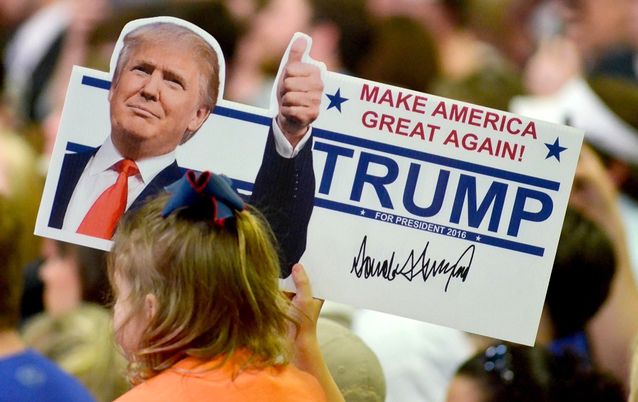
Donald Trump rally. Picture: REUTERS/RICK GUY
-
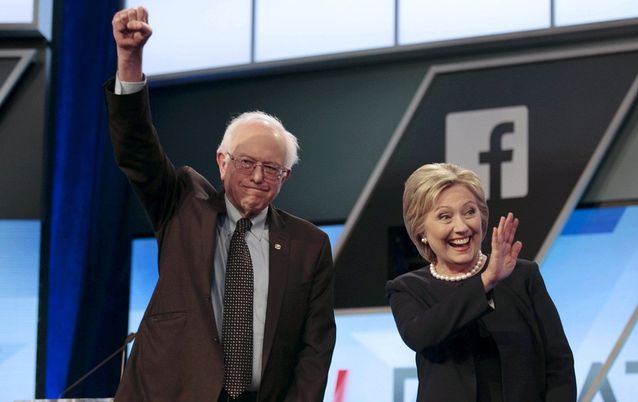
Democratic US presidential candidates Senator Bernie Sanders and Hillary Clinton wave before the start of the Univision News and Washington Post Democratic US presidential candidates debate in Kendall, Florida. Picture: REUTERS
WASHINGTON — In the US, these are days of rage, fuelled by a cocktail of gripes making for a White House race that’s been wild and raunchy.
Fist fights between opposing sides are now breaking out at rallies, where people give each other the finger. Candidates openly call each other liars, among other insults. Accusations of racism and bigotry have tainted the campaign trail.
One hopeful — brash Republican front-runner Donald Trump, of course — has even boasted in a veiled fashion about the size of his genitalia.
"This would all be fun if it weren’t so serious," said Patrick Haney, a professor of political science at Miami University of Ohio.
Thanks in part to the gnawing sensation that the so-called "American dream" — the idea that if you work hard, you will get ahead — is dead or comatose, it is the year of the outsider: the candidate claiming to be utterly free of the dysfunction of Washington-style, nothing-gets-done politics.
"There is a sort of fundamental level of irritability in the American electorate right now. Some of it is probably economic and some of it is social and cultural," said Mr Haney.
Paul Beck, a political scientist at Ohio State University, said the national funk cuts across party lines and to some extent stems from dissatisfaction with the status quo.
"The other thing is much more deeply seated and that really goes back decades, to the declining status of the middle class," Mr Beck said.
Expressed in numbers, it looks like this: in 1970, 62% of aggregate US income went to middle-income households. But in 2014, that figure was down to 43%, according to the Pew Research Centre.
This means the other ends of the income spectrum — the poor and the rich — are getting bigger.
Another poll, entitled American Rage and published in January by Esquire magazine, gave even grimmer numbers.
It found 52% of those polled say the American dream is dead and 54% believe they are worse off than they thought they would be when they were younger.
"We the people are pissed. And the body politic is burning up," the magazine wrote in an introduction to the polling data.
On another hot-button issue — immigration — Esquire said 46% of those polled felt immigrants were a burden because they took US jobs, housing and healthcare.
Mr Trump has tapped into these fears, vowing to deport immigrants here illegally, build a wall along the border with Mexico and institute a blanket ban on Muslims entering the country. Critics have heaped scorn on the businessman, saying he is fuelling hatred and racism. Rival John Kasich, the Republican governor of Ohio, says Mr Trump has created a "very toxic atmosphere".
Another Republican contender, Marco Rubio, called his language "dangerous."
Even President Barack Obama — the target of much of the anger expressed by Trump supporters — has weighed in, condemning the "divisiveness along the lines of race and faith" seen on the campaign trail.
Mr Trump says his rallies are nothing but a "love fest". And among the four remaining Republican candidates, he leads by a wide margin. Mr Trump, the man hogging the headlines, is a billionaire who has never held public office and is widely ridiculed by critics as a bigoted, clownish blowhard.
His party is described as cringing over the prospect that he will actually win the Republican nomination, which for his critics borders on handing over the election to the Democrats on a silver platter.
On the Democratic side, Bernie Sanders, a little known senator from a small state that many Americans could perhaps not find on a map — Vermont — is doing surprisingly well.
The core of his pitch is to heal what he says is a system sick with economic inequality and dominated by a political and financial elite.
Mr Sanders is giving Hillary Clinton — the former first lady and secretary of state who had been considered a shoo-in to win the nomination and perhaps go on to make history as the nation’s first female president — a good run for her money.
Beyond the economy, on both sides of American politics but particularly in the Trump camp, there was disquiet about the changing face of American culture, amid changes like gay marriage, Mr Beck said.
Among Mr Trump’s supporters, some are so disgusted with the establishment they are willing to vote for him even while believing that he is not electable.
"On the Republican side, a third of the base is willing to kind of walk off the gangplank and vote for Trump," Mr Beck said.
Ditto for Mr Sanders. Ms Clinton gets much higher marks for electability than he does, but many Mr Sanders soldiers are so fed up with things as they are and delighted with his message of renewal that it does not matter for them if their vote in the primaries is wasted.
"There are a lot of people who are supporting Sanders who really don’t care whether he can win in November," Mr Beck said.
AFP


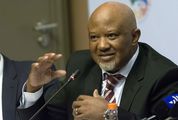
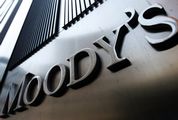


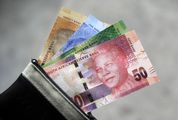

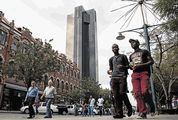
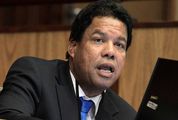

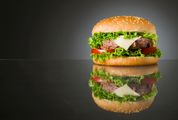
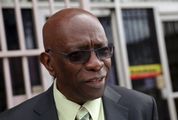











Change: 1.61%
Change: 1.42%
Change: 2.53%
Change: 0.71%
Change: 3.67%
Data supplied by Profile Data
Change: 0.65%
Change: 0.43%
Change: 1.61%
Change: 0.00%
Change: 0.56%
Data supplied by Profile Data
Change: 0.22%
Change: 0.24%
Change: 0.58%
Change: 1.08%
Change: 1.20%
Data supplied by Profile Data
Change: 0.35%
Change: 0.92%
Change: 0.45%
Change: 0.69%
Change: 1.54%
Data supplied by Profile Data